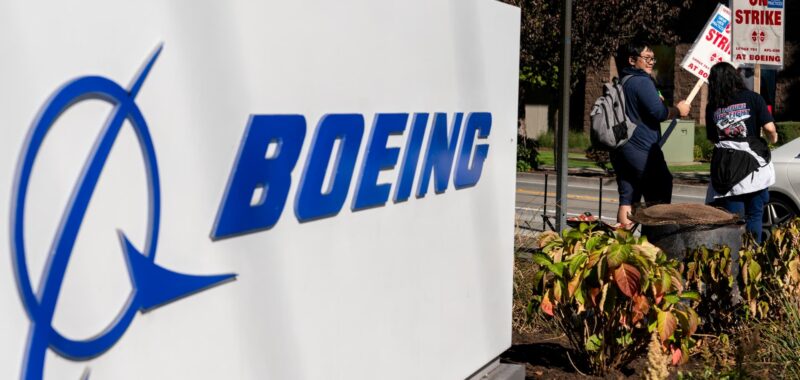Workers picket outside the Boeing Co. manufacturing facility during a strike in Renton, Washington, US, on Thursday, Oct. 3, 2024.Â
David Ryder | Bloomberg | Getty Images
Boeing‘s new CEO Kelly Ortberg will have a chance to lay out his vision for the troubled manufacturer in his first quarterly call with analysts on Wednesday. At the same time, thousands of striking machinists will vote on a new labor deal.
Boeing released preliminary third-quarter results earlier this month, showing revenue of $17.8Â billion, which would be down less than 2% from a year earlier, as well as a loss of $9.97 a share and a cash outflow of $1.3 billion. It said it ended the third quarter with $10.5 billion in cash and marketable securities.
Meanwhile, more than 32,000 machinists walked off the job early Sept. 13 after overwhelmingly voting down a contract that included 25% raises, among other changes. A new proposal, unveiled Saturday, included 35% raises over four years, a higher signing bonus and 401(k) contributions.
The strike costs Boeing $1 billion a month, according to S&P Global Ratings, and getting to a speedy conclusion is crucial for the fragile aerospace supply chain, where furloughs are already beginning.
Analysts are optimistic that the deal will pass. Results of the labor vote are expected late Wednesday night.
Here’s what analysts polled by LSEG expect Boeing will report for the third quarter:
- Loss per share:Â $10.52 adjusted
- Revenue:Â $17.82 billion
Ortberg, who took the helm of Boeing in August, was tasked with restoring the company’s reputation and stamping out quality problems on aircraft and in other programs. In January, a door plug blew out minutes into an Alaska Airlines flight on a 737 Max 9, and the near-catastrophe reignited safety concerns from regulators and customers.
Ortberg has already said Boeing will slash 10% of its global workforce of about 170,000 people and hinted at the company slimming down.
“Beyond navigating our current environment, restoring our company requires tough decisions and we will have to make structural changes to ensure we can stay competitive and deliver for our customers over the long term,” he said in a memo to employees on Oct. 11.

